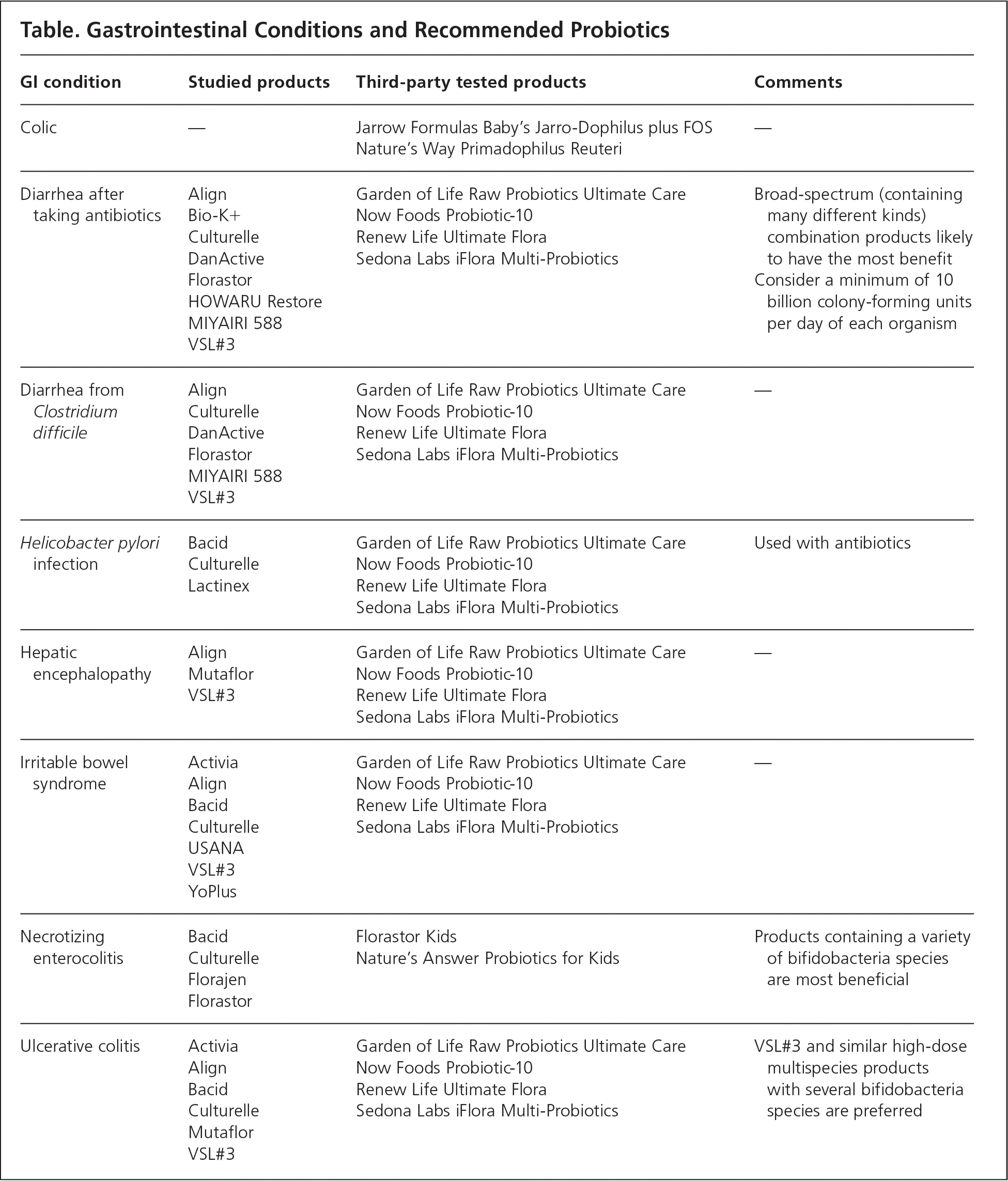
Am Fam Physician. 2017;96(3):online
See related article on probiotics for gastrointestinal complications.
What are probiotics?
Probiotics are organisms (bacteria and yeasts) that are taken to improve health.
Why should I use them?
Our bodies are home to trillions of organisms. The right variety of these organisms can keep us healthy. Different types of organisms have different jobs. Some keep us healthy by fighting other disease-causing organisms. Others interact with immune cells to reduce inflammation or prevent allergic reactions.
Good, health-protecting organisms are fed by certain foods. When we eat, organisms in our gastrointestinal (GI) tract eat too. Sometimes, the numbers of good organisms can get low (for example, if you have diarrhea or if you take antibiotics). When this happens, taking probiotics may help increase the number of good organisms in your GI tract.
Which GI conditions can be improved with probiotics?
Probiotics can help if you have diarrhea after using antibiotics, Clostridium difficile–associated diarrhea, ulcerative colitis, or irritable bowel syndrome (IBS). They can also help with colic in infants. See the table for a list of products to use for specific GI conditions.
Which GI conditions are not improved with probiotics?
Probiotics are probably not helpful if you have pancreatitis or Crohn disease.
Which species of probiotics are helpful?
Some of the probiotic species that have shown benefit include Bifidobacterium, Lactobacillus, Leuconostoc, Saccharomyces boulardii, and Streptococcus.
What are the risks of taking probiotics?
Probiotics are considered safe for most people (infants, children, adults, and older persons). However, they may cause problems in people with cancer or people who do not have a normal immune system. Rarely, probiotics have caused a serious blood infection in people with cancer.
What should I know when buying probiotics?
It is important to read the label. Think of three “Ds”: diversity, dose, and delivery.
Diversity means that there are a lot of different species included, not just one.
Dose is measured in colony-forming units (CFUs). You should aim for at least 10 billion CFUs per species.
Delivery is the way that you take the probiotic. Enteric-coated capsules make it more likely that more probiotic cells will reach your intestine. Probiotics can also be taken as powders, gel caps, gummies, liquids, and foods such as yogurt. Delivery affects the dose that makes it to your intestine. Choose a delivery method that is easy and comfortable so you will be more likely to take probiotics regularly.

| GI condition | Studied products | Third-party tested products | Comments |
|---|---|---|---|
| Colic | — | Jarrow Formulas Baby's Jarro-Dophilus plus FOS Nature's Way Primadophilus Reuteri | — |
| Diarrhea after taking antibiotics | Align | Garden of Life Raw Probiotics Ultimate Care | Broad-spectrum (containing many different kinds) combination products likely to have the most benefit |
| Bio-K+ | Now Foods Probiotic-10 | ||
| Culturelle | Renew Life Ultimate Flora | ||
| DanActive | Sedona Labs iFlora Multi-Probiotics | ||
| Florastor | Consider a minimum of 10 billion colony-forming units per day of each organism | ||
| HOWARU Restore | |||
| MIYAIRI 588 | |||
| VSL#3 | |||
| Diarrhea from Clostridium difficile | Align | Garden of Life Raw Probiotics Ultimate Care | — |
| Culturelle | Now Foods Probiotic-10 | ||
| DanActive | Renew Life Ultimate Flora | ||
| Florastor | Sedona Labs iFlora Multi-Probiotics | ||
| MIYAIRI 588 | |||
| VSL#3 | |||
| Helicobacter pylori infection | Bacid | Garden of Life Raw Probiotics Ultimate Care | Used with antibiotics |
| Culturelle | Now Foods Probiotic-10 | ||
| Lactinex | Renew Life Ultimate Flora | ||
| Sedona Labs iFlora Multi-Probiotics | |||
| Hepatic encephalopathy | Align | Garden of Life Raw Probiotics Ultimate Care | — |
| Mutaflor | Now Foods Probiotic-10 | ||
| VSL#3 | Renew Life Ultimate Flora | ||
| Sedona Labs iFlora Multi-Probiotics | |||
| Irritable bowel syndrome | Activia | Garden of Life Raw Probiotics Ultimate Care | — |
| Align | Now Foods Probiotic-10 | ||
| Bacid | Renew Life Ultimate Flora | ||
| Culturelle | Sedona Labs iFlora Multi-Probiotics | ||
| USANA | |||
| VSL#3 | |||
| YoPlus | |||
| Necrotizing enterocolitis | Bacid | Florastor Kids | Products containing a variety of bifidobacteria species are most beneficial |
| Culturelle | Nature's Answer Probiotics for Kids | ||
| Florajen | |||
| Florastor | |||
| Ulcerative colitis | Activia | Garden of Life Raw Probiotics Ultimate Care | VSL#3 and similar high-dose multispecies products with several bifidobacteria species are preferred |
| Align | Now Foods Probiotic-10 | ||
| Bacid | Renew Life Ultimate Flora | ||
| Culturelle | Sedona Labs iFlora Multi-Probiotics | ||
| Mutaflor | |||
| VSL#3 | |||
Where can I get more information?
Your doctor
AAFP's Patient Information Resource
Labdoor (probiotic product rankings)
National Institutes of Health: Dietary Supplement Label Database
National Institutes of Health: National Center for Complementary and Integrative Health
August 2017
